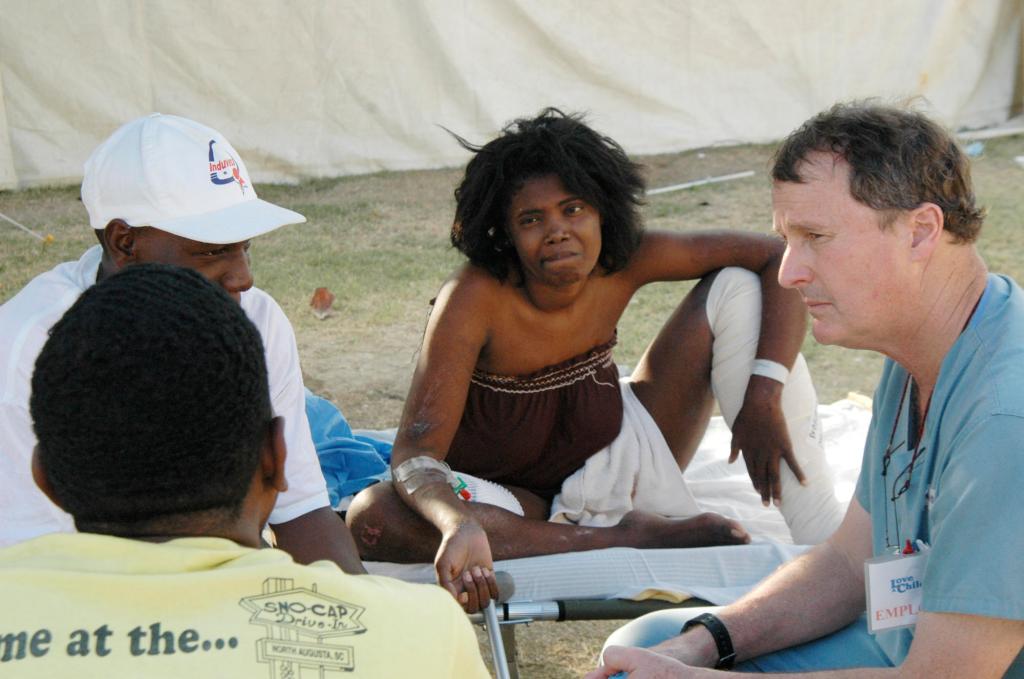Dr. David Fitz has volunteered his surgical skills for humanitarian missions in Kenya, Nicaragua and Mongolia. But the conditions he encountered recently in Haiti were the most challenging.
Working in a makeshift hospital at an orphanage near Port-au-Prince, Fitz operated in tents where temperatures climbed past 95 degrees. Doctors lacked the equipment needed for advanced surgeries to rescue damaged limbs. Infection rates were high and many Haitians had limb injuries so severe they had to choose between amputation and death.
The injured kept pouring in, and doctors didn’t have a chance to do much follow-up.
”Usually, when you go on a mission, you go away feeling great. You leave in this situation and you feel badly,” said Fitz, a surgeon with Plastic & Hand Surgical Associates in Portland. ”You feel like you’re abandoning them.”
Fitz, who has worked in Portland for 22 years, volunteers with Operation Smile, a charitable group that provides free surgeries to children with cleft palates and other facial deformities in impoverished countries.
When Haiti’s capital was struck by an earthquake in January, he began looking for some way to help. Advanced medical expertise — especially someone trained in skin grafts, severe wound treatment and reconstructive surgery — was badly needed.
”All the people who had truncal and head injuries died,” he said. ”The only (injured) people who survived were people who had extremity injuries, and there are just thousands of them.”
In the weeks after the earthquake, many of those people received rudimentary treatment — if any — for their injuries. The lack of antibiotics and clean water made infection a serious problem, he said.
Smile International has been working in Haiti for decades and arranged for Fitz to connect with public health specialists from Harvard Humanitarian Initiative. Fitz cancelled his appointments and vacation plans, left for Haiti on Feb. 2 and returned on Feb. 14.
The health care workers created a makeshift hospital at an orphanage in Fond Parisien, about 25 miles from Port-au-Prince.
It was also about a five-minute helicopter ride for people who had been treated initially on the USNS Comfort, the U.S. Navy’s hospital ship, and needed follow-up care.
For two weeks, Fitz worked with an orthopedic surgeon, anesthetists and nurses from around the country treating hundreds of people.
”You make your rounds in the tents and it’s unbelievable the number of children with amputated arms and legs, pelvis and femurs with external fixators,” he said, referring to the metal supports used to hold bones in place. ”They’re going to need prosthetic limbs and need rehabilitation.”
Fitz remembers a 30-year-old police officer who was badly injured when the station collapsed on him, crushing 80 fellow officers. His two best friends were killed and he was now responsible for 10 children, theirs and his own.
Fitz, who speaks French, recalled telling him that his crushed arm, which had become infected, would have to be amputated.
”It’s a very difficult conversation,” he said. ”It’s not your normal doctor-patient relationship. We’re there and we’re gone. We’re not there to follow up with them.”
Another young man, told he would die if his infected arm was not amputated, refused and left the hospital.
The health care workers had help from some unforeseen allies. Haitian Boy and Girl Scouts helped out and another nongovernment organization provided security. When people recovered enough to be discharged, they were sent to a displaced persons camp a short distance away.
The conditions for operating — and just functioning — were tough, he said.
”I got used to taking a one-bucket shower. A wonderful thing was a two-bucket shower,” he said.
In the operating room, the heat was exhausting.
”You would do a case, drink two or three bottles of water and change your clothes,” he said.
In his one-man tent, there was little rest at night, even with earplugs.
”You’re on edge and don’t sleep well. At 2 in the morning a rooster would crow, and every rooster in the valley would start answering, and a donkey would start braying for no reason and occasionally a cow. There were also stray dogs.”
Fitz says in all, the hospital needs to be able to perform about 150 different surgical procedures, but the operating rooms are inadequate for many of them.
He is exploring whether they might be able to improve the equipment available at local hospitals there or perhaps create a mobile hospital unit, a MASH-type operating room that is well-equipped.
Send questions/comments to the editors.


